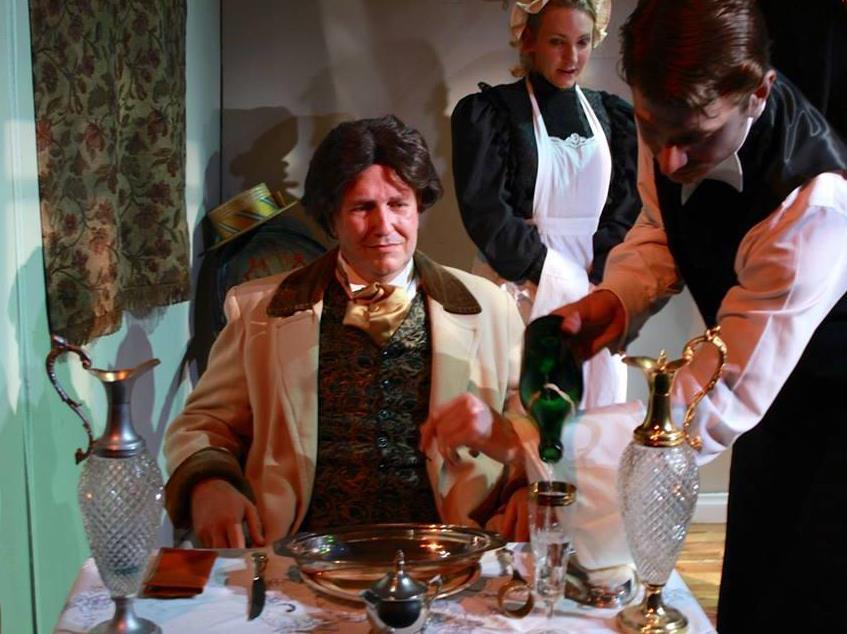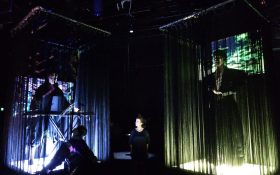Mockingbird Theatre Company’s The Judas Kiss. Image supplied.
There are multiple challenges to staging a biographical play about one of the world’s most celebrated playwrights and social performers, set at an historical moment accredited with greatly influencing contemporary representations of sexual identity (straight or queer). Not only does Oscar Wilde’s brilliant and tragic historical legacy threaten to render attempts to capture his idiosyncratic voice as amateurish fandom; Wilde’s renowned distaste for the sentimental warns against overly literal interpretations of his life. There is also the shadow of Brian Gilbert’s 1997 film, Wilde, with Stephen Fry, Jude Law and Vanessa Redgrave putting their stamp of authority on subject matter which is, by now, folklore.
Written in 1998 by Sir David Hare (Plenty, The Hours), The Judas Kiss interrogates the relationship between Wilde and his younger aristocratic lover, Lord Alfred Douglas, nicknamed ‘Bosie’, to illuminate the dangerously deluded, petulant and self-obsessed characteristics of Wilde’s muse. Act 1 opens on an afternoon during Wilde’s ill-fated 1895 prosecution of Bosie’s father, the Marquess of Queensberry, for libel, when it becomes clear that, instead of flipping public opinion in his favour, Wilde instead is to be charged with ‘gross indecency’. Act 2 sees Wilde and Bosie holed up in Naples in 1897 following Wilde’s jail term – two years hard labour in Reading Gaol.
The final challenge to stagings of The Judas Kiss is one of contemporary relevance. Popularly reviled for his role in Wilde’s downfall, Bosie has more recently been subject to historical re-readings that attempt to depict him in a more sympathetic light. In this way, The Judas Kiss leaves itself open to charges of anachronism.
Mockingbird Theatre Company’s latest production meets these challenges with competence. The play opens promisingly with a sex scene, albeit between heterosexuals, who we discover are Phoebe and Arthur (Lauren Murtagh and Zak Zavod), staff in Wilde and Bosie’s London hotel rooms. The sex establishes an aura of transgression which is more symbolic than intellectual – to the degree that the depiction of heterosexual sex is supposed to connote universal desire in an unremittingly queer context, it is also a bit weird. Aesthetically, however, the naked bodies look nice against the degenerate setting of a post-party hotel room. L’amour is interrupted by duty when a senior footman, Mr Moffatt (Soren Jensen), disturbs the couple to announce the imminent arrival of Wilde’s posse, headed by Robert Ross (Oliver Coleman), Wilde’s long-time friend and first male lover. Flirting between Mr Moffat and Arthur signals a more fluid approach to sexuality, or it is sexual harassment? These early frissons invite interesting questions about historical sexual practices, ethics and morality but unfortunately seem more to be more thematic framing devices than indicators of the play’s ongoing substantive concerns.Heavy with dialogue, the bulk of Act 1 focuses on in-fighting between Robert Ross and Bosie (Nigel Langley) about whether Wilde should seek exile before imminent charges are laid. On the one hand, Ross, the (losing) voice of reason, has our sympathy and his persona is deftly inhabited by the straight-shooting Coleman. On the other hand, Bosie – spoilt, naïve, absorbed in his own family dramas and more nerdy than I expected – is blatantly the wrong guy to spearhead one of the era’s most fundamental legal campaigns.
Nigel Langley is convincing as the irritating Bosie, although I’m unsure whether this is entirely to his credit. In this opening night performance, Langley appears too often in silhouette and needs to pivot more to face the audience. The Wilde of The Judas Kiss is a Wilde under siege, and Chris Baldock brings us our hero fatigued, weakened and impressionable. There is much making of speeches and breathy and dramatic grand statements issuing from the leading men. At worst, this turns the play into a protracted couple fight; at best, it communicates a sense of the historical and personal crises of the times.
Knowing what is to come, we want to wrest the glass of wine from Oscar’s hand and urge concerted action. ‘I have always had a low opinion of what people call action,’ Wilde quips. How can genius be so hopeless? Perhaps we have been too harsh on Bosie.
By Act 2, everyone seems to have settled into their roles. Wilde has gained some ironic distance from his lover and Baldock plays him effortlessly and with increasing dignity. Beautiful lighting, courtesy of Rob Sowinksi and Alex Beyer, gives the stage an impressionist glow before maturing into a melancholy sunset. Reunions between Bosie and Wilde, Wilde and Ross, and Wilde and his family are all blighted. Throughout the play, some consideration is given to the fate of Wilde’s wife, Constance Lloyd, and their sons Cyril and Vyvyan Holland, which reminds us how queer narratives and domestic contexts are always interlinked. The only winner seems to be those holding the purse strings, who, in this case, happen to be the Queensberry family. That the prize is always Bosie is one of those things we have to take on historical word.
The historical detail of The Judas Kiss is so well known that it becomes incumbent on each production to make its mark on the material. With its accomplished production team, Mockingbird Theatre presents a taut and passionate staging of the tragic events surrounding Wilde’s downfall. At times I can’t help but wonder if the production is, in some ways, more sophisticated than the script on which they’re relying.
Rating: 3 ½ stars out of 5
The Judas Kiss
Mockingbird Theatre Company
By David Hare
Directed by Jason Cavanagh
Co-director: Celeste Cody
Production Manager: Kellie Bray
Assistant Production Manager: Emma Walmsley
Stage Manager: Alex Beyer and Celeste Cody
Lighting Designer: Rob Sowinski
Lighting/Sound Operator: Alex Beyer
Cast: Chris Baldock, Nigel Langley, Oliver Coleman, Zak Zavod, Lauren Murtagh, Soren Jensen and Nores Cerfeda.
Theatre Works, Acland St, St Kilda
www.theatreworks.org.au
14 – 22 March





